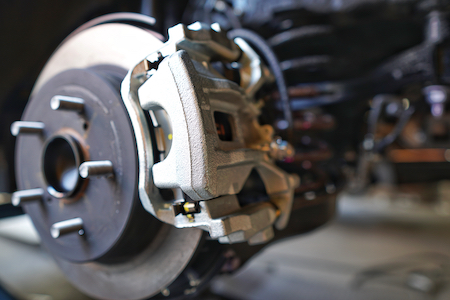When you hop into your car and drive to school or work, you don’t think much about how it operates. You turn the key and go.
Yet if you stop to think about each system, chances are you’d push the braking system to the top of the list in importance. After all, without the braking system, your car would experience extensive damage pretty quickly, while you may face injury yourself.
How much do you know about the braking system? Brake pads. Rotors. Brake fluid. Calipers. There are several major components that create an effective braking system. If any one piece is damaged or not working correctly,
Understanding brake calipers
While most people understand that pushing on the brake pedals initiates the braking process, they don’t understand a brake caliper’s job. Brake calipers are a crucial part of making your car slow down and come to a stop as you push down on the brake pedal.
A caliper is a component of the disc brake system, which is what most cars have in the front brakes.
The brake caliper sits like a clamp on a wheel’s rotor. You can actually see it on most cars if you glance through the spokes on your wheel. The caliper houses the brake pads and pistons. Its main purpose is to clamp down on the rotor, creating friction with the brake rotors.
When you press down on the brake pedal, brake fluid creates pressure, causing the piston to move against the brake pad, which in turn pushes it against the brake rotor. The more pressure you put on the brake pedal, the more friction between the pads and rotors. Until your vehicle comes to a complete stop.
The brake caliper sits inside the wheel, and is connected to the master cylinder through a series of tubes, hoses and valves. These connections push brake fluid through the system to make it work. If any piece or component in this system isn’t operating well, it can greatly impact the braking process. And that can put you and the people around you in danger.
What happens if you drive on a bad brake caliper?
If you drive with a bad brake caliper, you’re risking the entire braking system not operating as it should.
The caliper houses the brake pads and pistons. A stuck caliper means the brake pad will not completely pull away from the brake rotor. A part of the brake pad will have constant pressure against the rotor while you drive. Which also means part of the braking system will be engaged all the time.
This can add stress to the entire braking system. It can also add stress to the transmission, which can cause failure earlier.
At a minimum, it will cause your brake pad to wear down prematurely. This means you’ll be replacing your brake pads more frequently, and putting yourself at risk if it doesn’t engage properly when you step on the brake pedal.
As soon as you notice a problem, fixing it is your best solution.
When is it time to replace brake calipers?
While you might not notice a problem right away, eventually you’ll start to notice your brakes aren’t working the way they should. A bad caliper can cause a variety of warning signs, signaling to you a potential problem.
Pulling to the right or left – one of the biggest warning signs is a vehicle that doesn’t drive straight. As you’re driving down the road, does your vehicle pull to the right or left? As you’re braking, do you notice the pull get more prominent? If one of the calipers is bad, it’ll impact the connection between the brake pad and the rotor, causing your vehicle’s stopping function to be compromised.
Heat coming off the wheel – as you can imagine, when the brake pad connects with the rotor, it creates a lot of friction. This friction gives off tremendous heat. Under normal driving conditions, this heat dissipates quickly. But if the connection is constant, the heat continues to grow. If you suspect a stuck caliper, stop the vehicle and turn off the engine. Place your hand near the wheel without touching it. Can you feel more heat than the other wheels? This may be a sign of a stuck caliper. Bring it in for an inspection right away.
Dirty brake pads – imagine all the wear and tear your brake pads see as you drive. From ice and snow, to the one-hundred degree days in the summer months, your brake pads deal with a lot of dirt and debris kicked up from the road as you drive. Sometimes that dirt can build up on your brake pads, causing the caliper to stick. A mechanic may be able to clean them and get them working once again. If they are worn, you can replace the brake pads before they cause any more problems.
Brake hose problems – the braking system contains multiple parts to remain in good working condition. If the brake hose wears out, it won’t deliver brake fluid properly to the various parts. Without brake fluid, the master cylinder won’t be able to control the brake caliper movement. This can be assessed by a mechanic, and a brake hose replacement may be necessary.
The best way to keep your calipers in good working condition is to ensure your brake pads are replaced and the brake fluid is topped off. Brake pads are the most frequently part replaced on the braking system, with most brake pads being replaced every 10,000 to 20,000 miles.
Tracking your maintenance items can alert you to potential problems before they exist. Are your brake pads nearing your vehicle’s suggested guidelines? Are you pushing the 20,000 mile marker? It may be time to schedule an inspection with one of our mechanics. We can evaluate the entire system, and ensure your brakes are safe and ready to work every time you drive.

